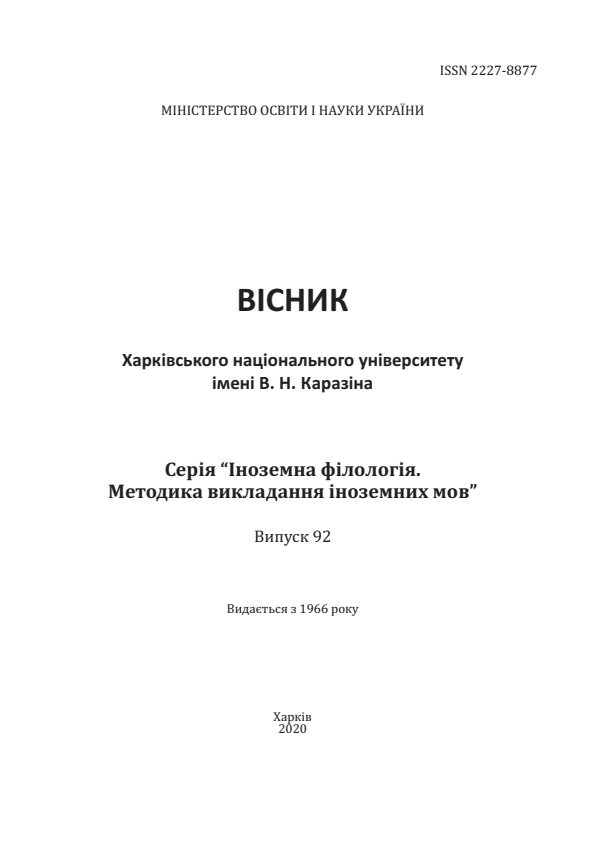Assessment of Students’ Academic Achievements in Contemporary School
Abstract
The author shares the view of researches who state that we lack clarity on learning outcomes; do not have appropriate tools to track student progress, use assessment instruments that do not match corresponding learning objectives. This leads to misunderstanding among Ministry of education, school principals, parents, teachers, and students. Traditionally all these groups support the use of standardized tests and consider them the indicator of knowledge assimilation. At the same time in the process of learning students must develop not only practical grammar, vocabulary, phonetic skills and macro reading, speaking, listening, and writing skills. They must master cognitive skills to be able to efficiently gain knowledge, absorb information, analyze it, and evaluate new ideas proceeding from personal needs and goals. These critical and creative thinking skills should also become the object of assessment. Taking into account learning aims, we set up two standards that might be applied at the English lesson: the macro skills assessment standard and the cognitive skills assessment standard. A skills assessment index (SAI) is provided. The standard for assessing essay-writing skills (SAWS) is designed, rubrics (a scoring guide used to evaluate the quality of students' response for “excellent”, “good”, “satisfactory” marks) are suggested. With the purpose of measuring the effectiveness of the designed standard and SAI, the experiment was carried out. The obtained results proved the working hypotheses. The following conclusion is drawn. Common understanding of the approaches to the assessment of different kinds of activities enhances students' positive emotions, fosters their motivation to study better and demonstrate academic achievement not only to groupmates, but also to parents, teacher, and school administration.
Downloads
References
/References
Voskresenskaja, N. M. Opyt razrabotki standartov obrazovanija v zarubezhnyh stranah [Monitoring the Implementation of International Standards on the Teaching]. Available at: https://cyberleninka.ru/article/n/opyt-razrabotki-standartov-obrazovaniya-v-zarubezhnyh-stranah. (in Russian)
Crawford, A. D. (2006). Tekhnolohiyi rozvytku krytychnoho myslennya uchniv [Teaching and Learning Strategies for the thinking Classroom]. Kyiv: Pleyada Publ. (in Ukrainian)
Nikolayevа, S. Yu. (ed.) (1999). Metodyka navchannja inozemnykh mov v serednikh navchaljnykh zakladakh: pidruchnyk [Methods of Teaching Foreign Languages at School: textbook]. Kyiv: Lenvit Publ. (in Ukrainian).
Sverdlova, I. O. (2015). Dydactichni osnovy upravlinja cognitivnymi navichkami uchniv [Didactic basics of controlling students’ cognitive skills]. Naukovyi Visnyk Melitopolskoho derzhavnoho pedahohichnoho universytetu – Scholary Messenger of Melitopol State Pedagogical University,15(2), 83–89. (in Ukrainian)
Low, M. G. (1995). Thresholds in Reading. Boston: Heinle and Heinle Publishers. (in English)
Watkins, P. (2005). Learning to Teach English. A Practical Introduction for New Teachers. Addlestone: DELTA Publishing. (in English)
Воскресенская Н. М. Опыт разработки стандартов образования в зарубежных странах. URL: https://cyberleninka.ru/article/n/opyt-razrabotki-standartov-obrazovaniya-v-zarubezhnyh-stranah (дата звернення: 23.11.2020)
Кроуфорд А. Технології розвитку критичного мислення учнів. Київ : Плеяди, 2006. 217 с.
Методика навчання іноземних мов в середніх навчальних закладах : / під керівництвом С. Ю. Ніколаєвої. Київ : Ленвіт, 1999. 320 с.
Свердлова І. О. Дидактичні основи управління когнітивними навичками учнів. Науковий Вісник Мелітопольського державного педагогічного університету. 2015. Вип. 15(2). С. 83–89.
Low M. G. Thresholds in Reading. Boston : Heinle and Heinle Publishers, 1995. 246 p.
Watkins P. Learning to Teach English. A Practical Introduction for New Teachers. Addlestone : DELTA Publishing, 2005. 144 p.




